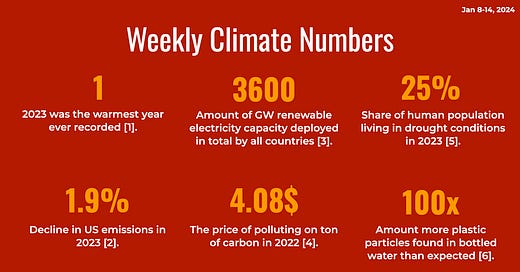[Jan 8-14'24] 2023 was number 1
State of the climate 2023, succesful climate activism in 2023, price of carbon emissions in 2022 was ridiculous and new fossil fuel ad campaign.
Welcome to this week’s edition of The Weekly Climate 🎉
References: [1], [2], [3], [4], [5] and [6].
‼️News you can’t miss
Here’s one important scary/bad (🙀), good (😻), interesting (😼) and fossil (💩) news item.
🙀 The State of the climate 2023 report: Record-breaking surface and ocean temperatures
😻 Here’s a highlight of succesful climate activism in 2023
😼 Price of carbon emissions dropped significantly in 2022
💩 New fossil fuel campaign targets fears of energy security
👩⚕️ Status: Climate & Science
Let’s look at how we’re doing this week!
[#2023] — The State of the Climate in 2023 saw record-breaking surface temperatures and ocean heat. Climate models and observations showed that temperatures in 2023 were in the upper quartile of model assessments. Greenhouse gas concentrations reached new highs, with CO2 being the largest contributor to global surface temperature increase. Sea levels continued to rise, driven by melting land ice and thermal expansion of water. Glacier and ice sheet loss, particularly in Greenland, contributed to sea level rise. Antarctic sea ice reached record-low levels, while Arctic sea ice remained within the historical range. Looking ahead to 2024, predictions indicate that it is likely to be slightly warmer than 2023. However, the long-term trend of increasing global temperatures driven by human emissions of greenhouse gases remains a significant concern.
[#snow] — A study has found that climate change is causing a significant decline in snow levels in parts of the Northern Hemisphere. The research confirms that human-caused climate change has led to declines in snowpack in at least 31 river basins. When a region warms to an average temperature of 10C, snow starts to melt away quickly. This decline in snowpack has far-reaching consequences, including water shortages and the impact on ski resorts. The Northeast and Southwest of the United States, along with Europe, are among the regions experiencing the fastest loss of snowpack.
📰 The 7 Grand Challenges
⚡️Decarbonize Electricity
Clean electricity is the one do-or-die challenge we must solve.
[#USemissions] — According to estimates by the Rhodium Group, U.S. carbon emissions fell 1.9% in 2023, largely due to a significant decrease in coal use for electricity generation. However, emissions need to fall three times faster for the rest of the decade to meet the country's climate goals. The decline in emissions was driven by the closure of coal power plants and the increased use of natural gas, wind, and solar power. The transportation sector saw a slight increase in emissions, while emissions from the industrial sector rose due to methane leaks from drilling operations. The United States still has a long way to go to achieve its emission reduction targets.
[#renewables] — A new report from the International Energy Agency reveals that global renewable energy capacity is projected to fall short of the tripling target set at the COP28 conference. Despite the plummeting costs of renewable technology, challenges such as high interest rates and supply chain disruptions are hindering the growth of renewables. Additional policy interventions and financing are needed to meet the target, especially in the wind industry. Long permitting timelines and the need for funding in developing countries are also highlighted as challenges in the transition to renewable energy.
🏘 Reduce impact of urban and rural areas
Lowering the impact of urban and rural areas.
[#gasolineVSev] — Gasoline prices may be low, but charging an electric vehicle (EV) is still cheaper (US numbers). EVs cost less to drive and emit less carbon pollution compared to gasoline-powered vehicles. The cost of charging an EV is equivalent to $1 to $2 per gallon of gasoline in most parts of the country, making it a more affordable option. The map provided shows the price of charging an EV compared to the cost of gasoline. While electricity prices may vary, EV charging remains cheaper than filling up with gasoline.
Keep reading with a 7-day free trial
Subscribe to The Weekly Climate to keep reading this post and get 7 days of free access to the full post archives.




